The timetable of the Tennessee General Assembly once sprawled a bit, with a session ending sometime in May, generally. But now and then, one would get into June and even, within the memory of many legislators still serving, go on later than that.
There was the time in 2001 when Jimmy Naifeh, the longtime speaker of the state House of Representatives and a no-nonsense legislative boss if there ever was one, stepped down from his perch on the House dais, stood for a moment in the well, and took a few steps into the main central aisle of the chamber, as if he meant to do something hands-on.
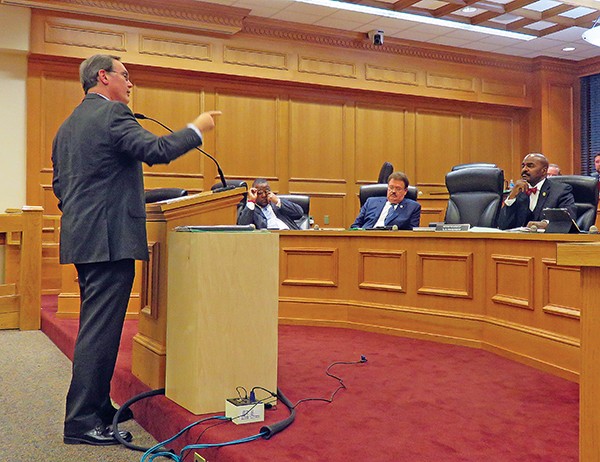 Photographs by Jackson Baker
Photographs by Jackson Baker
Rep. G.A. Hardaway and other Civil Justice subcommittee members that state law overrides a U.S. Supreme Court decision.
The look on Naifeh’s face was somewhere between wrathful and pleading, as he intoned loudly, “It’s July, folks!”
Indeed it was. Those were the years, from the late 1990s into the early years of the current century, when state government, grappling with looming financial shortages of all kinds, and struggling in particular with the costs of the ever-expanding rolls of TennCare, was looking desperately for ways to raise money.
The impasse had gotten to the point that Republican Governor Don Sundquist, a dependable fiscal conservative during his years as a Reaganite Congressman, broke with his own personal history and his party’s traditional philosophical base and proposed something as daring as a state income tax. One result of that was a mass protest, whetted by radio talk-show hosts, that culminated, on the night of July 12, 2001, in an unruly mob invasion of the state Capitol and its grounds.

Dianne Baker of Millington was one of several spokespersons for Shelby County’s suburbs who gave the county’s legislative delegation an earful last week.
Windows got broken, the heavy locked doors of the state Senate chamber, where a compromise income-tax package was being negotiated, were pounded on, and whatever deal had been about to happen there was aborted.
There would not be a fiscal solution of any kind until the next year, a time when several parks were closed and various state services had begun to be shut down. Forgoing the national holiday, the two legislative chambers met on July 4th and agreed to a patchwork revenue package based on hiking the state sales tax to its current rate.
The same year, a Democratic governor, former health-care entrepreneur, and ex-Nashville Mayor Phil Bredesen, was elected. He would prove as atypical to his party’s image as Sundquist had been to his. Launching an austerity regime, Bredesen slashed the TennCare rolls and imposed across-the-board departmental budget cuts of 8 percent.

get some pressure from the press.
And thus did one era make way for another.
The next 15 years in state government would see a progressive slide away from governmental activism toward various kinds of retrenchment. The temper of the state’s voters shifted, and both Naifeh and the state Senate’s venerable Democratic Speaker John Wilder would eventually have to surrender control of their chambers to Republicans — though the new House Speaker, Beth Harwell, a Nashvillian, would be somewhat more mellow in her conservatism than Ron Ramsey of Kingsport, who displaced Wilder in the Senate.
The populism of the left yielded year by year to the populism of the right. The famous argument over guns versus butter would be decided in favor of guns. Literally so, as the NRA and the home-grown Tennessee Firearms Association began having their way with legislators, and it became harder and harder to find public places that were off limits to lethal weaponry. Bars, parks, parking lots, schools — all yielded in turn to legislation backed by the gun lobby.
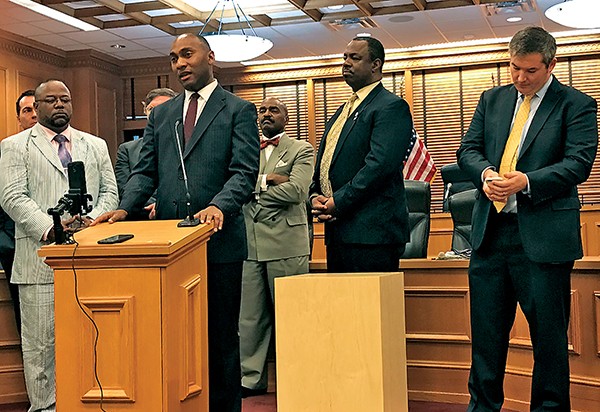
Senator Jeff Yarbro of Nashville wait their turn.
Attitudes toward education shifted, as well. Where once the focus of public education had been on the teaching incentives of Governor Lamar Alexander or the fiscal largesse and curricular pump-priming of Governor Ned McWherter’s Basic Education Plan (BEP), now it was channeled through various formulas that were deconstructive of the traditional public-school concept and smacked of privatization at their core.
At the insistence of Ramsey, who saw the Tennessee Education Association as a political adversary, teachers’ bargaining rights were legislated out of existence. And even the more moderate Republican governor, oil-company scion Bill Haslam, gave the go-ahead to a veritable plethora of concepts — charter schools, takeover districts administered by the state, online “districts” run by profit-seekers from out of state, and standardized testing as an apparent end in itself — that unraveled the whole notion of what public schools had been.
Having basically slain the idea of an income tax, progressive or otherwise, the new Republican legislative majority (a super-majority in both chambers after 2014, assured of majority votes without need of — or concern for — Democratic votes) took steps to make sure it stayed dead, authorizing a state referendum on a constitutional ban of a state income tax authored by state Senator Brian Kelsey (R-Germantown).

Three legislative veterans from Shelby County, all former state representatives, were among those who turned up last week at a reunion for General Assembly members at the Ellington Agricultural Center in Nashville. From l to r: Ed Haley, now city manager of Millington; Chris Turner, now a General Sessions Criminal Court judge; and Dan Byrd, now vice chairman and COO of the Bank of Bartlett. Haley was a Republican; Turner and Byrd served as Democrats.
As was the case with Republicanism in the nation as a whole, the state’s new GOP establishment was a strange yokedom of fiscal and social conservatives, whereby the advocates of, say, tort reform limiting awards in personal-damage litigation made common cause with the opponents of abortion and gay rights. And vice versa.
There was a nether end of the reigning coalition, too. With the stripped-down Democratic caucus depending heavily on minority members, racial and otherwise, there was a certain kind of reactionary sentiment to be found on the other side — embodied, arguably, in the GOP insistence for photo-ID voting and, without doubt, in the “discovery” by two Republican legislators of a potential jihadist foot-bath in the Capitol that turned out to be a mop sink.
And who could forget the immortal legislative contributions of former Republican state Senator Stacey Campfield (R-Knoxville), a one-man cornucopia of bizarre and mean-spirited legislation — a bill calling for death certificates for aborted fetuses, his “Don’t-say-Gay” bill forbidding mention of homosexuality in elementary school, another measure requiring school personnel to out gay students to their parents, a bill to deny welfare payments to parents of poorly performing students, his charge of racism when he, a white, was denied membership in the Legislative Black Caucus, etc.
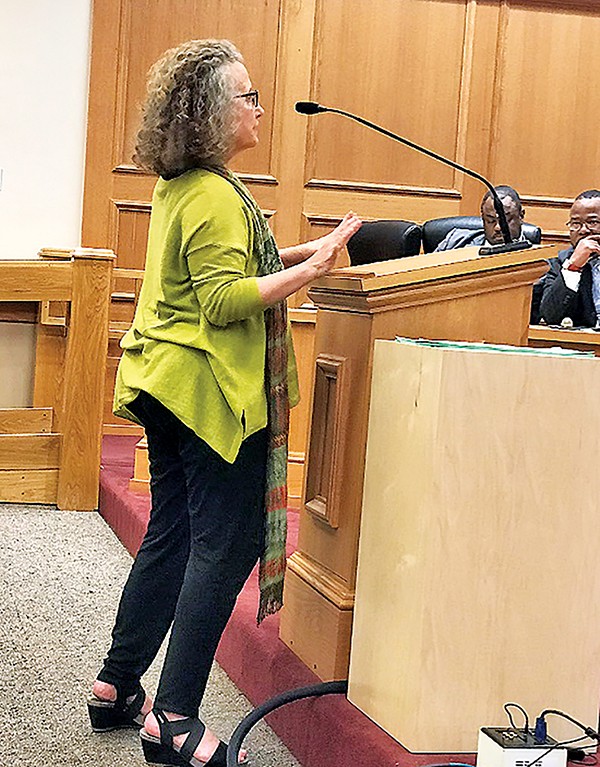
here testifying against the “natural marriage” bill before the House Civil Justice Subcommittee, has stayed busy on the civil liberties front.
Those bills did not pass, but, as much as the gun zealotry of the last several legislative sessions, the goofy stuff from the now departed Campfield (he was defeated in the 2014 GOP primary by the infinitely more dignified Richard Briggs) became a metaphor of sorts for what was arguably an unserious period in Tennessee legislative history — one that rewarded selfish and peripheral concerns at the expense of fundamental structural needs.
(Campfield’s bills may have gone by the wayside, but the legislature did, after all, vote in all solemnity to enshrine the Barrett .50 caliber as the Official State Rifle; and it failed by a trice to designate the Bible as the Official State Book.)
Things may be changing.
Against all odds, Nashville seems to be getting serious. And, ironically, a signal of that potential transformation came last week through the aegis of a major participant in the events of July 12, 2001, that pivotal moment when a mob action deflected an effort toward a long-term reform.
One of those actively involved that night in working out the compromise that might have yielded a workable income-tax measure was a Republican state Senator from Chattanooga named David Fowler. After leaving the legislature in 2006, Fowler donated $20,000 to an organization called the Family Action Council of Tennessee (FACT). The former state senator and lawyer ultimately became the chief spokesperson for FACT, which advocates social conservatism and attention to fundamentalist Christian concerns in public policy.
Now president of FACT, Fowler lives in Nashville and is an accustomed presence on Capitol Hill. Last year he famously led a group of conservative pastors in a rally on behalf of a bill that would compel transgender students to use bathrooms designated for their birth genders. The issue was one of several these days, in Tennessee and many another states, which contrast the social traditions of a social or religious group with the economic realities of the state as a whole.
Mindful of this inherent conflict, Fowler hit it head on, acknowledging that passage of the bill might cause the state to lose important conventions and forfeit possible industrial relocations, but calling on the legislature to “put their principles and their conscience above matters of mere economics.”
But the matter, of course, was — and is — more complex than that. In the 21st century, the dichotomy cannot be reduced to one of money versus morality. Words like “principles” and “conscience” can also be adduced, and increasingly are so adduced, to support an evolving social belief in the human and legal rights of transgenders.
When push came to shove, that fact probably did as much or more to tip the balance in legislators’ minds against the “bathroom bill,” as did the admittedly intense lobbying against it by the state’s business interests. The bill’s sponsor, Representative Susan Lynn (R-Mt. Juliet) withdrew the measure.
But it returned in this session, sponsored by Representative Mark Pody (R-Lebanon) and Senator Mae Beavers (R-Mt.Juliet), two legislators lacking in the theatrical flair of a Campfield but equally prone to playing Horatio-at-the-Gate for causes which an increasing number of their legislative colleagues see as retrograde and wrong-headed.
And this year the bill failed even to get a motion out of the Senate Education Committee, a fact which both shocked and gratified Henry Seaton of the ACLU, who observed that “it seems like we are making progress” in raising legislators’ consciousness on the transgender issue.
And then there was what was called the “Natural Marriage” bill, also sponsored by the duo of Pody and Beavers. And there was Fowler in the House Civil Justice Subcommittee last week, making the best argument he could for a measure, reserving marriage in Tennessee to cases involving a man and a woman, that manifestly is in conflict with the U.S. Supreme Court’s watershed 2015 opinion in the Obergefell v. Hodges cases declaring same-sex marriages legal everywhere in the United States.
Fowler’s argument — that, while the Supreme Court’s opinion compelled Tennessee to recognize same-sex marriages in other states, it did not invalidate the state’s own ability to define marriage within its own borders — was ingenious in a sense, but it also had the taint of the disingenuous. Memphis Democrat G.A. Hardaway called him on it, pointing out further that Fowler was a party to two separate lawsuits challenging the Supreme Court’s authority to deal with state marriage laws — a potential conflict of interest.
Like the lawsuits he was engaged in, Fowler’s testimony was seemingly based on the highly questionable thesis that the U.S. Supreme Court had no authority to override a state law on marriage — notwithstanding the obvious fact that the court had done just that.
In the end, the committee by unanimous agreement did what a legislative unit normally does for bills with no chances of passage. It punted, “rolling” the bill, in legislative vernacular — until a late point in the next session.
A clear pattern seemed to be developing in this session of the General Assembly. With, at most, a month left to go in the 2017 session, all attention was being focused, not on the kinds of tendentious and eccentric measures that had dominated so much of the legislature’s recent history but on indisputably serious matters relating to the root realities of the state itself — or to the counties and municipalities that comprise it.
The session’s chief gun bill, an “open carry” bill eliminating a need for permits to carry a concealed weapon, was disposed of summarily last week, in the same session of the House Civil Justice Subcommittee that shunted aside “natural marriage.”
That measure, HB 40, co-sponsored by Representative Micah Van Huss (R-Jonesborough) and Beavers (who seems almost Zelig-like in her attachment to fringe bills), was dismissed in the committee by voice vote.
As the General Assembly hits the stretch in the 2017 session, it will be focusing its major efforts on the centerpiece of Haslam’s agenda, an infrastructure program announced in his State of the State message of late January.
This governor is given to catchy titles for his major legislation. There was Tennessee Promise, his name for a scholarship program, paid for mainly by money diverted from the lottery-built Hope Scholarship fund, paying student expenses at the state’s community colleges. There was Tennessee Reconnect, a scholarship program for adults needing to finish lapsed degree efforts.
Most memorably, there was Insure Tennessee, Haslam’s name for a plan that, through a waiver granted by Barack Obama’s Department of Health and Human Services, would have allowed Tennessee to partake of an estimated billion dollars or more of annual federal funding to expand TennCare, Tennessee’s version of Medicaid.
A partisan reaction by the GOP super-majority to a program it identified with “Obamacare” killed Insure Tennessee, but the newly serious legislature might give some version of the program a re-examination, especially since the Trump administration in Washington failed in its preliminary efforts to kill the ACA.
In any case, the Haslam infrastructure proposal, an ambitious and long overdue program of roadway rehabilitation billed in the State-of-the-State as the Improve Act, is still very much alive, though the governor’s original proposal for financing the plan’s $10 billion worth of improvements with a 7-percent increase in the state gas tax, coupled with decreases in a variety of other taxes, including the sales tax on groceries, has been modified once or twice and is subject to more changes. It is up for consideration in finance committees of both chambers this week.
Think of it: A General Assembly that once actually wasted time on the legality of eating roadkill is now clearly training attention on the condition of Tennessee’s roads.
One important modification to the Improve Act occurred in a Senate committee, with an amendment sponsored by state Senate Majority Leader Mark Norris (R-Collierville). Norris, who is eyeing a 2018 gubernatorial race (and who has billboards in Shelby County and elsewhere proclaiming him to be “Fighting Elder Abuse in Tennessee”), made sure to include in the bill several financial-relief provisions for Tennessee’s military veterans and its elderly population.
Even as the legislature’s Republican leadership is settling down to serious business, its once-dominant Democratic contingent, now become a shrunken minority (5 senators out of 33; 25 Democrats out of 99), is into a comeback of sorts, pointing out in a recent end-of-week press conference that Norris’ amendment has a distinct resemblance to provisions long championed by themselves. The Democrats, led by Representative Craig Fitzhugh of Ripley in the House and Memphian Lee Harris in the Senate, are also campaigning hard for a revival of some variant of Insure Tennessee.
Matters still to be resolved include two key ones of major importance to Memphis and Shelby County — a proposal for a “pilot program” of publicly funded private-school vouchers, restricted to the Shelby County Schools system and a possible revisiting of the de-annexation issue that has roiled relations between Memphis and its suburbs. (See Politics: “They’re Back!”.)
In any case, things have unmistakably taken a serious turn up Nashville way. Anybody who doubts that should ask former state Representatives Jeremy Durham of Franklin and Mark Lovell of Eads, both forced out of their legislative positions during the last year for allegations of sexual hanky-panky.
Heck, folks, hanky-panky used to be the General Assembly’s very stock-in-trade!

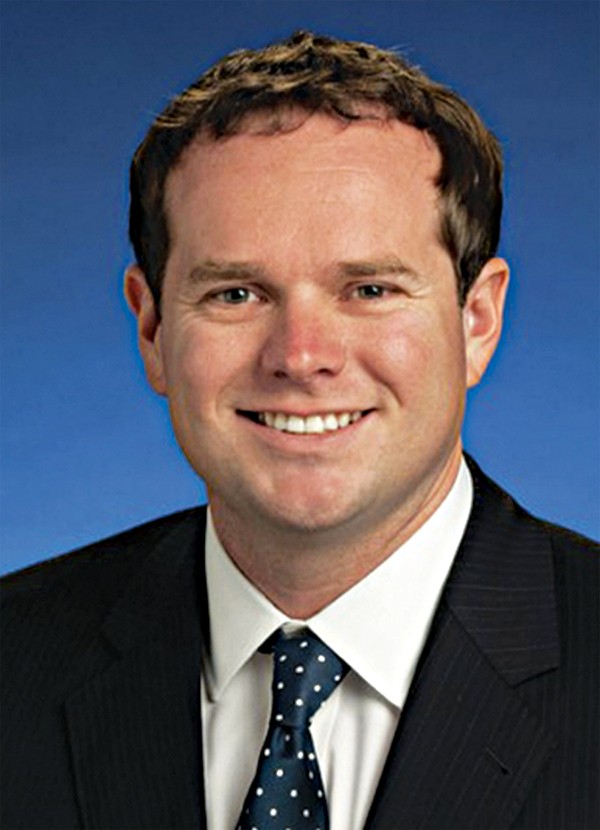


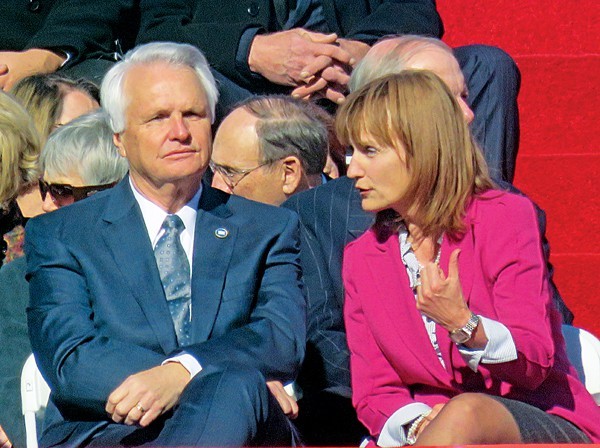 JB
JB